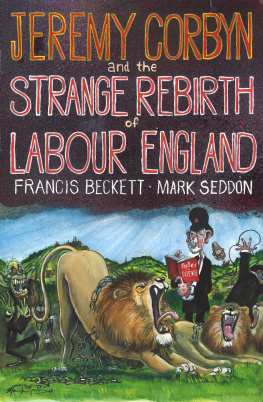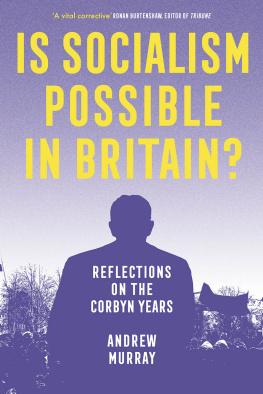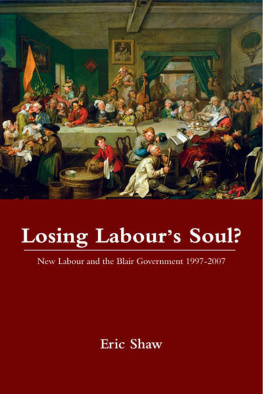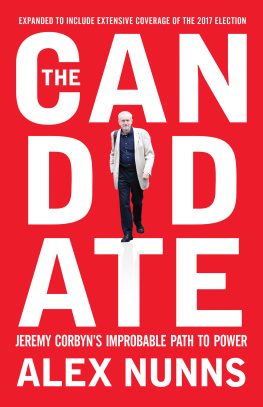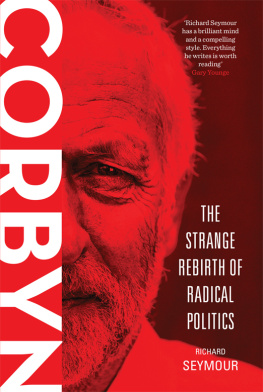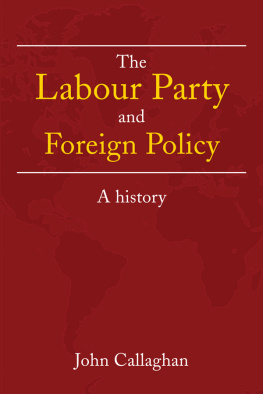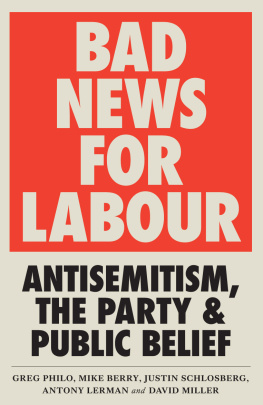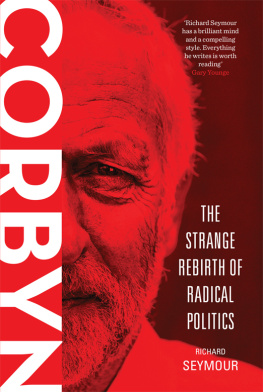T he authors would like to thank in particular: Iain Dale, Martin Rowson and Matt Lyus, without whom this book may not have been possible. Nor would it have been without the support and enthusiasm of the tightly knit and dedicated Biteback team: James Stephens, Olivia Beattie, Bernadette Marron and Padraig Farrell. We should also like to thank the following for their advice, wisdom, general good nature, and indulgence: Clare Short, Jon Lansman, Peter Stefanovic, Emily Thornberry MP, Chris Kaufman, Jay Chavda, Stefan Stern, Grahame Morris MP, Ian Williams, Richard Kozul-Wright, John Cryer MP, Dan Carden MP, Jonathan Arkush, Baroness Dianne Hayter, Jeff Gold and the Working Families Party, the Democratic Socialists of America and the late, great, Rodney Bickerstaffe. And not forgetting, of course, Jon Wrobel and the wonderful staff of the Gay Hussar restaurant in Soho, London, closed for the present, but also set, we hope, for a rebirth.
T his started out as a book called The Strange Death of Labour England.
We were going to describe the inexorable process, which began in 1979 and continued through the Thatcher and Blair years, of dismantling the England we were brought up in, and replacing it with something much harsher, nastier and crueller; the England our children are going to have to live in because it is what the baby boomer generation have dumped on them. It was conceived over lunch in that most loved of Rabelaisian Labour canteens, the Gay Hussar Hungarian restaurant in Londons Soho.
That was the book we intended to write right up to 10 p.m. on 8 June 2017. Like most people, we had begun to assume Labours experiment with left-wing leadership would end that day in crushing defeat. This was despite the astonishing signals we were beginning to pick up on the ground, during the campaign. Yes, even seasoned optimists such as us were being ground down by the modern-day political curse; the pundits, their polls and their predictions.
Prime Minister Theresa Mays gamble of calling an unnecessary general election when she thought Labour was weak and divided and headed by a leader unpopular with his MPs and the mass media looked like it was paying off with a massively increased majority. She had even kicked off her campaign in Labour Halifax. And Labour, we thought, would react to defeat by plunging rightwards. It would look for a Tony Blair lookalike to lead it, and give up all hope of reviving Labour England. It would probably look, we felt, towards David Miliband, who was clearly, once again, looking at himself.
It was a book born out of unrelieved gloom. But the very next morning, during an excited telephone call, we changed not just the title of our book, but our vision of the future. Labour England would be reborn, but it would look very different. Not the strange death, but the strange rebirth.
The title was a tribute to George Dangerfields 1935 classic The Strange Death of Liberal England, and, just as Dangerfield did not mean just the Liberal Party, we didnt mean just the Labour Party.
We meant the Labour England that created, sustained and empowered the Labour Party and Labour governments; that made the country more caring, more instinctively irreverent and egalitarian, less class-ridden.
Labour England made the country what it was where we begin in 1978. The accepted narrative of this time was that this was an era of the Winter of Discontent, of unacceptable trade union power, of inflation and general mismanagement. But there is another narrative that better reflects both the truth and the Labour England of that time.
Britain had never been more equal as a society; the gap between rich and poor, never as narrow. Working-class families had jobs, often unionised jobs, which paid moderately well. Council housing was plentiful, family cars and holidays affordable. Young people actually got a chance to be creative if they wanted to before getting a job or going to college. People were, by and large, happier. They were more secure. They had a clearer idea about what was right and what was wrong.
Labour England was fundamentally a decent place. There was little time for the vulgar, idle rich, and there was respect for our public services and our public servants. Rather than make huge losses, as is the accepted narrative, the nationalised industries usually made pre-tax profits, which were ploughed back into them, and they belonged to us the people. There was a powerful attachment to a welfare state and health service that cared for people from cradle to grave. Labour governments and the Labour Party would not have existed without Labour England and, if they had existed, they would have been powerless.
Labour England was many things.
It was the National Health Service, Labours greatest and proudest creation. So powerful and deep was its reach into the nations psyche that even Margaret Thatcher wouldnt dare to destroy it.
It was the trade unions. A substantial section of the workforce were members of trade unions that fought for their interests at work, achieved great advances in health and safety conditions at work, and much else besides.
It was adult education, where those without material advantages were taught politics and the humanities: the local adult education institutes, university extramural departments, the Workers Educational Association, Morley College, the places immortalised in Lee Halls play The Pitmen Painters. In the 1970s, every university worth its salt had an extramural department. Today they all have business studies departments instead.
It was second-chance education. It was Birkbeck College, London, and the polytechnics, and a few of the universities, and Ruskin College, and, famously, the City Lit in central London. The City Lit is still there, but most of the people who used to go there forty years ago could not afford it today. Ruskin College was a route out of mindless routine work for thousands of trade union members, who went there sponsored by their unions; and Ruskin is just now closing its trade union courses.
It was Harold Wilsons new Open University.
It was universities where students received grants based upon their parental income and didnt pay tuition fees. Universities that encouraged mature students, that rejoiced in the arts, that had, at their heart, the idea that education was important for the sake of it, and not just for advancing up a career ladder.
It was community schooling. The idea of free comprehensive education for all, championed by the National Union of Teachers and Anthony Crosland, was that there should be a good local primary and secondary school wherever you lived, and communities were cemented by local schools that most children attended, and most parents cared about. Today schools are expected to compete for the brightest and easiest-to-teach pupils.
It was powerful local councils, able to provide a counterbalance to government, able to take decisions on priorities, and on the shape of local education, free of the dead hand of government control imposed in the Thatcher years.
It was council houses and council estates and the communities they housed.
It was local libraries.
And, of course, it was the Labour Party at a local level, fractious, quarrelsome, but alive with self-belief.
Labour England was also that curious meeting of minds, often between self-taught (or educated by life) working-class trade unionists and middle-class liberal intellectuals. You could see that alliance in human form at Labour Party general committee meetings in places like Norwich, Oxford and Bristol. They came together describing themselves often as socialists or sometimes social democrats.
And we do mean Labour England, not Labour Britain. It has its counterpart in Scotland and in Wales. But that is a different story, for a different book, and best written from Scotland and Wales. We mean the place where we, and Jeremy Corbyn, and John McDonnell, recovered from our childhood illnesses in the very earliest NHS hospitals, grew up, and were educated in the lavish, generous style of Labour England.

